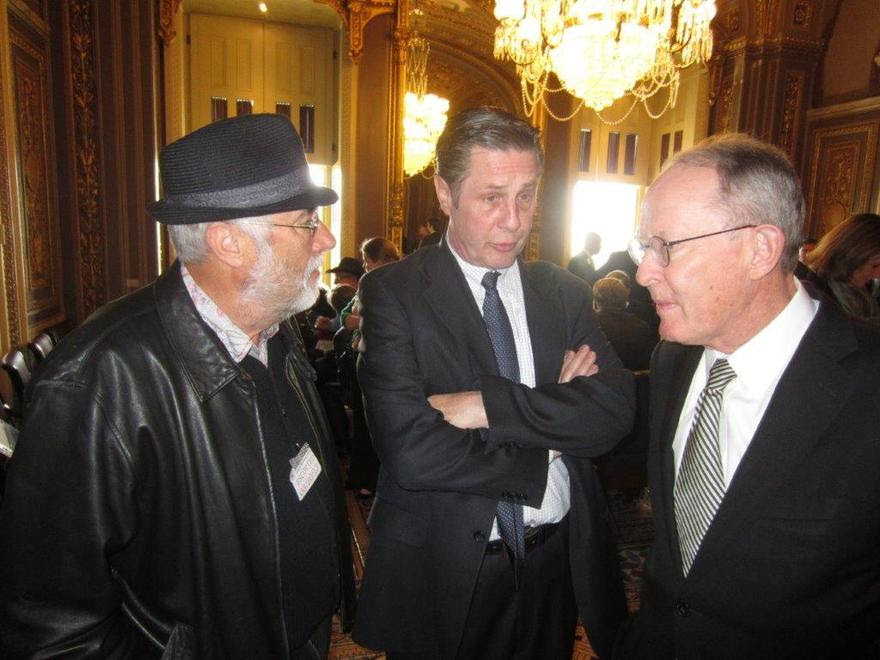

Pictured: Songwriter Roger Cook, NSAI Executive Director Bart Herbison and TN Senator Lamar Alexander discuss music issues outside the U.S. Senate chamber.
The Music Modernization Act will be introduced Wednesday (Jan. 24) in the United States Senate, following the House version of the bill that was filed in December.
Senators Orrin Hatch (R-UT), Lamar Alexander (R-TN), Christopher Coons (D-DE), Bob Corker (R-TN), Dick Durbin (D-IL), and Sheldon Whitehouse (D-RI) joined in introducing the Senate version of the bi-partisan legislation.
The Senate bill mirrors the House bill introduced by Congressmen Doug Collins (R-GA) and Hakeem Jeffries (D-NY) which reforms Section 115 of the U.S. Copyright Act to create a single licensing entity that administers the mechanical reproduction rights for all digital uses of musical compositions. On the performance rights side, the bill also replaces the current rate court system with the random assignment of judges used in most federal court cases, and allows the rate courts to review all relevant market evidence into the valuation of how songwriters are compensated by digital services.
This new system ensures that songwriters are paid when digital music services use their music, improves transparency, provides for better royalty rates, and gives songwriters increased involvement in how mechanical rights are licensed. It includes the benefits of the previously introduced Songwriter Equity Act which addresses two significant inequities under current copyright law that prevent songwriters and music publishers from receiving compensation that reflects the fair market value of their work.
Representatives from several music industry organizations have praised the bill.
“Songwriters will finally get a market-based mechanical rate standard, which should result in more equitable royalties from interactive streaming companies,” said Nashville Songwriters Association International (NSAI) President Steve Bogard. “Until now, we have been tied to outdated rate standards Congress first adopted for player piano rolls back in 1909. In addition, American songwriters will, for the first time, by law, receive at least half of all unclaimed digital mechanical royalties. I want to extend my deepest thanks to all of our introducing Senate sponsors. The Music
Modernization Act represents the most significant copyright reform in a generation.”
“This bill puts music publishers and songwriters in control of the digital mechanical licensing process and brings a marketplace rate standard that should lead to higher streaming royalties,” said NSAI Executive Director Bart Herbison. “And for the first time in history songwriters will receive more than half of unclaimed digital mechanical funds. When you consider the streaming services have agreed to pay associated costs, the MMA is the most beneficial legislation for songwriters in the digital era.”
NMPA President & CEO David Israelite said, “The MMA is the best hope for songwriters to achieve fair royalties and payments in the digital age. We are grateful to Senators Hatch, Alexander, Whitehouse, Corker, Durbin, Coons, Isakson and Jones for their attention to the struggles of music creators and for introducing the MMA, which we hope continues to gain momentum in the Senate.”
BMI President & CEO Mike O’Neill said, “The Music Modernization Act is an important step forward in protecting the rights of the American songwriter, and we thank Senators Hatch, Alexander, Whitehouse, Corker, Durbin, Coons, Isakson and Jones for their support of this important legislation. While we believe there is still more to do to protect the value of the performance right, we are encouraged by the inclusion of two important provisions that go a long way towards ensuring that songwriters and composers receive fair compensation for their creative work; the wheel assignment for rate court judges and the repeal of 114 (i) application to digital services. While we know this bill is not yet final, it represents an unprecedented cross-industry effort to introduce comprehensive music reform, and we look forward to working with all of the interested parties to further support this much needed legislation.”
ASCAP CEO Elizabeth Matthews said, “We thank Senators Hatch, Alexander, Whitehouse, Corker, Durbin, Coons, Isakson and Jones for ensuring that the Music Modernization Act addresses some of the most critical issues facing America’s songwriting community, including rate court reforms.”

Category: Featured, Financial/Legal, Publishing
About the Author
Jessica Nicholson serves as the Managing Editor for MusicRow magazine. Her previous music journalism experience includes work with Country Weekly magazine and Contemporary Christian Music (CCM) magazine. She holds a BBA degree in Music Business and Marketing from Belmont University. She welcomes your feedback at jnicholson@musicrow.com.View Author Profile


